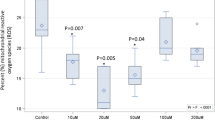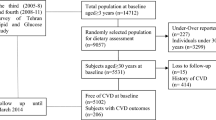Abstract
Objective: To determine whether dietary supplementation with a natural carotenoid mixture counteracts the enhancement of oxidative stress induced by consumption of fish oil.
Design: A randomised double-blind crossover dietary intervention.
Setting: Hugh Sinclair Unit of Human Nutrition, School of Food Biosciences, The University of Reading, Whiteknights PO Box 226, Reading RG6 6AP, UK.
Subjects and intervention: A total of 32 free-living healthy nonsmoking volunteers were recruited by posters and e-mails in The University of Reading. One volunteer withdrew during the study. The volunteers consumed a daily supplement comprising capsules containing fish oil (4 × 1 g) or fish oil (4 × 1 g) containing a natural carotenoid mixture (4 × 7.6 mg) for 3 weeks in a randomised crossover design separated by a 12 week washout phase. The carotenoid mixture provided a daily intake of β-carotene (6.0 mg), α-carotene (1.4 mg), lycopene (4.5 mg), bixin (11.7 mg), lutein (4.4 mg) and paprika carotenoids (2.2 mg). Blood and urine samples were collected on days 0 and 21 of each dietary period.
Results: The carotenoid mixture reduced the fall in ex vivo oxidative stability of low-density lipoprotein (LDL) induced by the fish oil (P=0.045) and it reduced the extent of DNA damage assessed by the concentration of 8-hydroxy-2′-deoxyguanosine in urine (P=0.005). There was no effect on the oxidative stability of plasma ex vivo assessed by the oxygen radical absorbance capacity test. β-Carotene, α-carotene, lycopene and lutein were increased in the plasma of subjects consuming the carotenoid mixture. Plasma triglyceride levels were reduced significantly more than the reduction for the fish oil control (P=0.035), but total cholesterol, HDL and LDL levels were not significantly changed by the consumption of the carotenoid mixture.
Conclusions: Consumption of the natural carotenoid mixture lowered the increase in oxidative stress induced by the fish oil as assessed by ex vivo oxidative stability of LDL and DNA degradation product in urine. The carotenoid mixture also enhanced the plasma triglyceride-lowering effect of the fish oil.
Sponsorship: The study was supported by funding from the Greek Studentship Foundation and from Unilever Bestfoods plc. Carotenoids were contributed by Overseal Foods plc.
This is a preview of subscription content, access via your institution
Access options
Subscribe to this journal
Receive 12 print issues and online access
$259.00 per year
only $21.58 per issue
Buy this article
- Purchase on Springer Link
- Instant access to full article PDF
Prices may be subject to local taxes which are calculated during checkout

Similar content being viewed by others
References
Agarwal S & Rao V (1998): Tomato lycopene and LDL oxidation. A human dietary intervention study. Lipids 33, 981–985.
Cao GH & Prior RL (1999): Measurement of oxygen radical absorbance capacity in biological samples. Methods Enzymol. 299, 50–62.
Collins RA, Olmedella B, South C, Granado F & Duthie S (1998): Serum carotenoids and oxidative DNA damage in human lymphocytes. Carcinogenesis 19, 2159–2162.
Cooke MS, Evans MD, Herbert KE & Lunec J (2000): Urinary 8-oxo-2′-deoxyguanosine—source, significance and supplements. Free Rad. Res. 32, 381–397.
Dugas TR, Morel DW & Harrison EH (1999): Dietary supplementation with beta-carotene but not with lycopene, inhibits endothelial cell mediated oxidation of LDL lipoprotein. Free Rad. Med. Biol. 26, 1238–1244.
Duthie JS, Ma AG, Ross MA & Collins AR (1996): Antioxidant supplementation decreases DNA damage in human lymphocytes. Cancer. Res. 56, 1291–1293.
Erhola M, Toyokuni S, Okada K, Tanaka T, Hiai H, Ochi H, Uchida K, Osawa T, Nieminen MM, Alho H & Lehtinen PK (1997): Biomarker evidence of DNA oxidation in lung cancer patients: association of urinary 8-hydroxy-2'deoxyguanosine excretion with radiotherapy, chemotherapy and response to treatment. FEBS Lett. 409, 287–291.
Esterbauer H, Striegl G, Puhl H & Rotheneder M (1989). Continuous monitoring of in vitro oxidation of human low density lipoproteins and resistance to oxidation. Free Rad. Res. Commun. 6, 67–75.
Esterbauer H, Gebicki J, Puhl H & Jurgens G (1992): The role of lipid peroxidation and antioxidants in oxidative modification of LDL. Free Rad. Med. Biol. 13, 341–390.
Etoh H, Utsunomiya Y, Komori A, Murakami Y, Oshima S & Inakuma T (2000): Carotenoids in human blood plasma after ingesting paprika juice. Biosci. Biotechnol. Biochem. 64, 1096–1098.
Foulon T, Richard J, Rayen N, Bournain JL, Beani C, Laborte F & Hadjian A (1999): Effects of fish oil fatty acids on plasma lipids and lipoproteins and oxidant antioxidant imbalance in healthy subjects. Scand. J. Clin. Lab. Invest 59, 239–248.
Friedewald WT & Levy RI (1972): Estimation of the concentration of low-density lipoprotein cholesterol in plasma, without use of the preparative ultracentrifuge. Clin. Chem. 18, 499–502.
Gaziano MJ, Hatta A, Flynn M & Krinsky NI (1995): Supplementation with β-carotene in vivo and in vitro does not inhibit LDL oxidation. Atherosclerosis 112, 187–195.
Indu M & Ghafoorunissa (1992): N-3 fatty acids in Indian diets comparison of the effects of precursor alpha-linolenic acid vs product long chain n-3 polyunsaturated fatty acids. Nutr. Res. 12, 569–582.
Krinsky NI (2001): Carotenoids as antioxidants. Nutrition 17, 815–817.
Leigh-Firbank EC, Minihane AM, Leake DS, Wright JW, Murphy MC, Griffin BA & Williams CM (2002): Eicosapentaenoic acid and docosahexaenoic acid from fish oils: differential associations with lipid responses. Br. J. Nutr. 87, 435–445.
Levy LW, Regalado E, Navarette S & Watkins RH (1997): Bixin and norbixin in human plasma: determination and study of the absorption of a single dose of annatto food color. Analyst 122, 977–980.
Lin Y, Burri BJ, Neidlinger TR, Muller H-G, Dueker SR & Clifford AJ (1998): Estimating the concentration of β-carotene required for maximal protection of low-density lipoproteins in women. Am. J. Clin. Nutr. 67, 837–845.
Loft S, Vistisen K, Ewertz M, Tjonneland A, Overvad K & Poulse HE (1992): Oxidative DNA damage estimated by 8-hydroxydeoxyguanosine excretion in humans—influence of smoking, gender and body mass index. Carcinogenesis 13, 2241–2247.
Mares-Perlman JA, Millen AE, Ficek TL & Hankinson SE (2002): The body of evidence to support a protective role for lutein and zeaxanthin in delaying chronic disease. Overview. J. Nutr. 132, 518S–524S.
McNamara JR, Huang C, Massov T, Leary ET, Warnick GR, Rubins HB, Robins SJ & Schaefer EJ (1994): Modification of the dextran-Mg high-density lipoprotein cholesterol precipitation method for use with previously frozen plasma. Clin. Chem. 40, 233–239.
Minihane AM, Khan S, Leigh-Firbank EC, Talmud PJ, Williams DL, Wright JW, Murphy MC, Griffin BA & Williams CM (2000): ApoE polymorphism and fish oil supplementation in subjects with an atherogenic lipoprotein phenotype. Arter. Throm. Vasc. Biol. 20, 1990–1997.
Pool-Zobel BL, Bub A, Muller H & Reckemmer G (1997): Consumption of vegetables reduces genetic damage in humans: first results of a human intervention trial with carotenoid rich foods. Carcinogenesis 18, 1847–1850.
Pryor WA, Stahl W & Rock CL (2000): Beta-carotene from biochemistry to clinical trials. Nutr. Rev. 58, 39–53.
Rao AVR & Agarwal S (2000): Role of antioxidant lycopene in cancer and heart disease. J. Am. Coll. Nutr. 19, 563–569.
Reaven PD, Beltz W, Parthasarthy S & Witzum JL (1993): Effect of dietary antioxidant combinations in humans: protection of LDL by vitamin E but not by β-carotene. Arter. Throm. 13, 590–600.
Riso P, Pinder A, Santangelo A & Porrini M (1999): Does tomato consumption effectively increase the resistance of lymphocyte DNA to oxidative damage? Am. J. Clin. Nutr. 69, 712–715.
Rousseau EJ, Davison AJ & Dunn B (1992): Protection by β-carotene and related compound against oxygen-mediated cytotoxicity and genotoxicity: implications for carcinogenesis and anticarcinogenesis. Free Rad. Med. Biol. 13, 407–433.
Smith JM, Inserra PF, Watson R & O'Neil KL (1999): Supplementation with fruit and vegetable extracts may decrease DNA damage in the peripheral lymphocytes of the elderly population. Nutr. Res. 19, 1507–1518.
Sorensen NS, Marckmann P, Hoy CE, van Duyvenvoorde W & Princen HMG (1998): Effects of fish oil enriched margarine on plasma lipids, low-density lipoprotein particle composition, size and susceptibility to oxidation. Am. J. Clin. Nutr. 68, 235–241.
Wander RC, Du SH, Ketchum SO & Rowe KE (1996): Effects of interaction of RRR-alpha-tocopheryl acetate and fish oil on LDL oxidation in postmenopausal women with and without hormone replacement therapy. Am. J. Clin. Nutr. 63, 184–193.
Author information
Authors and Affiliations
Contributions
Guarantor: MH Gordon.
Contributors: SK performed the practical work and analysed the data from the study, and contributed to the preparation of the manuscript. MHG contributed to the experimental design, data analysis and preparation of the manuscript.
Corresponding author
Rights and permissions
About this article
Cite this article
Kiokias, S., Gordon, M. Dietary supplementation with a natural carotenoid mixture decreases oxidative stress. Eur J Clin Nutr 57, 1135–1140 (2003). https://doi.org/10.1038/sj.ejcn.1601655
Received:
Revised:
Accepted:
Published:
Issue Date:
DOI: https://doi.org/10.1038/sj.ejcn.1601655
Keywords
This article is cited by
-
Antioxidants and breast cancer risk- a population-based case-control study in Canada
BMC Cancer (2011)
-
Effect of Spinacia oleraceae L. and Perilla frutescens L. on Antioxidants and Lipid Peroxidation in an Intervention Study in Healthy Individuals
Plant Foods for Human Nutrition (2010)
-
Innovative extraction procedure for obtaining high pure lycopene from tomato
European Food Research and Technology (2008)
-
Antioxidant vitamins and cancer risk: is oxidative damage to DNA a relevant biomarker?
European Journal of Nutrition (2008)
-
Tomatoes versus lycopene in oxidative stress and carcinogenesis: conclusions from clinical trials
European Journal of Clinical Nutrition (2007)



